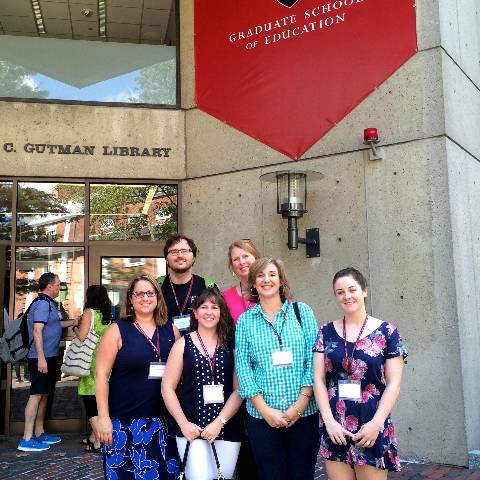

The following blog was cowritten by Media Arts Director Adrienne Forgette.
What We Did - The Experience
One of the most valuable ways that Darlington invests in its faculty is through professional development funds, including several pools of money specially designated for significant projects. Thanks to the Carla and Leonard Wood Faculty Professional Development Endowment Award, we had a truly transformative learning experience this summer.
We were part of a team of six faculty members from Middle and Upper School English, Library Services, and Media Arts, who wanted to understand the roles of reading and writing, research and digital communication in the lives of today’s youth—and tomorrow’s adults.
To that end, we attended the Future of Learning Institute, hosted by Harvard’s Graduate School of Education (HGSE), which showcased the latest thinking on globalization, mind/brain research, and the digital revolution. We spent a week in Cambridge, Mass. learning from some of the brightest minds in their fields, from education to neuroscience to international law. The experience built our understanding of current research, inspired our reflection on curriculum development, and made our brains hurt a bit by the end of each day.
There were so many brilliant minds in every room! Breaks and meals also offered great fellowship and we shared our daily thoughts over the tables of Harvard Square restaurants and, of course, hit the bookstore for Harvard souvenirs.
One of the defining moments occurred the night we invited Bruno della Chiesa, a founding scholar in the field of educational neuroscience and an all around fascinating person, to dinner. We spent more than four hours chatting about the future of learning, his latest projects, and Darlington’s distinctive combination of Southern culture and global citizens. We even got the scoop on his close friendship with the famous Noam Chomsky! Our evening was so enriching that Dr. della Chiesa plans to visit us here at Darlington later this year.
To hear more, ask us or anyone on our team, which also included ELA-8 English teacher Charlie Beaucham, Assistant Upper School Librarian Michael Hall, Director of ESL Tara Inman, and Upper School English teacher Jennifer Sikes.
To see Tweets from our experience in Cambridge, check out @MrsForgetteMJE, @bethcantsleep, and #hgsepzfol on Twitter.
What We Learned - The Institute
We are a learning species. We commit to education because we believe nurturing human potential matters tremendously. But in the midst of our everyday work, we as teachers, students, leaders, parents, and citizens can lose sight of the largest purposes of our work with young people. The Future of Learning Institute provided a chance to learn about and reflect on the major influences on teaching and learning in the 21st Century.
The Institute included plenary sessions, courses we selected based on interest, and learning groups for discussion and application to our own work. Our team interacted with educational professionals of all kinds, about 50% of whom traveled from other countries; in our learning groups, we worked with people from Argentina, Australia, Singapore and Spain, to name a few. The leaders and attendees posed big questions, such as:
What learning matters? What are we teaching now that doesn’t?
How do we foster relevant, lifelong, life-worthy learning experiences for our students?
How do we teach our students how to think?
We were pushed to understand what learning must be and do if it is to prepare tomorrow’s adults to handle the complex problems and changing technologies of a highly connected, globalized future world. We cannot predict the kinds of situations they will navigate, and thus we can’t teach about those situations; instead, we must make them great navigators.
The Institute offered ways of building students’ dispositions as synthesizers, problem-solvers, system designers, ethical choice-makers, and so on. These topics are the focus of HGSE’s research group, Project Zero, and many of the plenaries and courses allowed Project Zero researchers to share the most important outcomes of their work. Some of the topics included:
making thinking visible to develop thinking skills
meaningful work for a meaningful life
what brain science really tells us about learning
intercultural relations in a globalized world
the synergy of emotion and cognition
fostering slow thinking
systems design and system thinking
identity, ethics, and our digital lives
leading and developing faculty for the future of learning
Over the coming weeks and months, our group will be blogging on these issues and how they relate to our work as educators. We invite you to come along on our journey as we contemplate how the Future of Learning influences the future of education at Darlington.